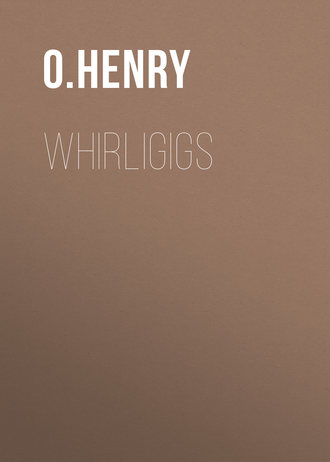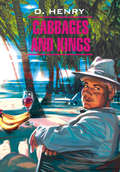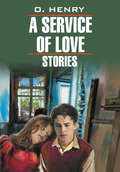
О. Генри
Whirligigs
Then there came upon Lorison an overwhelming revulsion of his perspective. It may be that he had been ripe for it, that the abnormal condition of mind in which he had for so long existed was already about to revert to its balance; however, it is certain that the events of the last few minutes had furnished the channel, if not the impetus, for the change.
The initial determining influence had been so small a thing as the fact and manner of his having been approached by the officer. That agent had, by the style of his accost, restored the loiterer to his former place in society. In an instant he had been transformed from a somewhat rancid prowler along the fishy side streets of gentility into an honest gentleman, with whom even so lordly a guardian of the peace might agreeably exchange the compliments.
This, then, first broke the spell, and set thrilling in him a resurrected longing for the fellowship of his kind, and the rewards of the virtuous. To what end, he vehemently asked himself, was this fanciful self-accusation, this empty renunciation, this moral squeamishness through which he had been led to abandon what was his heritage in life, and not beyond his deserts? Technically, he was uncondemned; his sole guilty spot was in thought rather than deed, and cognizance of it unshared by others. For what good, moral or sentimental, did he slink, retreating like the hedgehog from his own shadow, to and fro in this musty Bohemia that lacked even the picturesque?
But the thing that struck home and set him raging was the part played by the Amazonian prisoner. To the counterpart of that astounding belligerent – identical at least, in the way of experience – to one, by her own confession, thus far fallen, had he, not three hours since, been united in marriage. How desirable and natural it had seemed to him then, and how monstrous it seemed now! How the words of diamond thief number two yet burned in his ears: "If you ever get a girl, she'll have a picnic." What did that mean but that women instinctively knew him for one they could hoodwink? Still again, there reverberated the policeman's sapient contribution to his agony: "A man these days and nights wants to know what his women folks are up to." Oh, yes, he had been a fool; he had looked at things from the wrong standpoint.
But the wildest note in all the clamour was struck by pain's forefinger, jealousy. Now, at least, he felt that keenest sting – a mounting love unworthily bestowed. Whatever she might be, he loved her; he bore in his own breast his doom. A grating, comic flavour to his predicament struck him suddenly, and he laughed creakingly as he swung down the echoing pavement. An impetuous desire to act, to battle with his fate, seized him. He stopped upon his heel, and smote his palms together triumphantly. His wife was – where? But there was a tangible link; an outlet more or less navigable, through which his derelict ship of matrimony might yet be safely towed – the priest!
Like all imaginative men with pliable natures, Lorison was, when thoroughly stirred, apt to become tempestuous. With a high and stubborn indignation upon him, be retraced his steps to the intersecting street by which he had come. Down this he hurried to the corner where he had parted with – an astringent grimace tinctured the thought – his wife. Thence still back he harked, following through an unfamiliar district his stimulated recollections of the way they had come from that preposterous wedding. Many times he went abroad, and nosed his way back to the trail, furious.
At last, when he reached the dark, calamitous building in which his madness had culminated, and found the black hallway, he dashed down it, perceiving no light or sound. But he raised his voice, hailing loudly; reckless of everything but that he should find the old mischief-maker with the eyes that looked too far away to see the disaster he had wrought. The door opened, and in the stream of light Father Rogan stood, his book in hand, with his finger marking the place.
"Ah!" cried Lorison. "You are the man I want. I had a wife of you a few hours ago. I would not trouble you, but I neglected to note how it was done. Will you oblige me with the information whether the business is beyond remedy?"
"Come inside," said the priest; "there are other lodgers in the house, who might prefer sleep to even a gratified curiosity."
Lorison entered the room and took the chair offered him. The priest's eyes looked a courteous interrogation.
"I must apologize again," said the young man, "for so soon intruding upon you with my marital infelicities, but, as my wife has neglected to furnish me with her address, I am deprived of the legitimate recourse of a family row."
"I am quite a plain man," said Father Rogan, pleasantly; "but I do not see how I am to ask you questions."
"Pardon my indirectness," said Lorison; "I will ask one. In this room to-night you pronounced me to be a husband. You afterward spoke of additional rites or performances that either should or could be effected. I paid little attention to your words then, but I am hungry to hear them repeated now. As matters stand, am I married past all help?"
"You are as legally and as firmly bound," said the priest, "as though it had been done in a cathedral, in the presence of thousands. The additional observances I referred to are not necessary to the strictest legality of the act, but were advised as a precaution for the future – for convenience of proof in such contingencies as wills, inheritances and the like."
Lorison laughed harshly.
"Many thanks," he said. "Then there is no mistake, and I am the happy benedict. I suppose I should go stand upon the bridal corner, and when my wife gets through walking the streets she will look me up."
Father Rogan regarded him calmly.
"My son," he said, "when a man and woman come to me to be married I always marry them. I do this for the sake of other people whom they might go away and marry if they did not marry each other. As you see, I do not seek your confidence; but your case seems to me to be one not altogether devoid of interest. Very few marriages that have come to my notice have brought such well-expressed regret within so short a time. I will hazard one question: were you not under the impression that you loved the lady you married, at the time you did so;"
"Loved her!" cried Lorison, wildly. "Never so well as now, though she told me she deceived and sinned and stole. Never more than now, when, perhaps, she is laughing at the fool she cajoled and left, with scarcely a word, to return to God only knows what particular line of her former folly."
Father Rogan answered nothing. During the silence that succeeded, he sat with a quiet expectation beaming in his full, lambent eye.
"If you would listen – " began Lorison. The priest held up his hand.
"As I hoped," he said. "I thought you would trust me. Wait but a moment." He brought a long clay pipe, filled and lighted it.
"Now, my son," he said.
Lorison poured a twelve month's accumulated confidence into Father Rogan's ear. He told all; not sparing himself or omitting the facts of his past, the events of the night, or his disturbing conjectures and fears.
"The main point," said the priest, when he had concluded, "seems to me to be this – are you reasonably sure that you love this woman whom you have married?"
"Why," exclaimed Lorison, rising impulsively to his feet – "why should I deny it? But look at me – am fish, flesh or fowl? That is the main point to me, I assure you."
"I understand you," said the priest, also rising, and laying down his pipe. "The situation is one that has taxed the endurance of much older men than you – in fact, especially much older men than you. I will try to relieve you from it, and this night. You shall see for yourself into exactly what predicament you have fallen, and how you shall, possibly, be extricated. There is no evidence so credible as that of the eyesight."
Father Rogan moved about the room, and donned a soft black hat. Buttoning his coat to his throat, he laid his hand on the doorknob. "Let us walk," he said.
The two went out upon the street. The priest turned his face down it, and Lorison walked with him through a squalid district, where the houses loomed, awry and desolate-looking, high above them. Presently they turned into a less dismal side street, where the houses were smaller, and, though hinting of the most meagre comfort, lacked the concentrated wretchedness of the more populous byways.
At a segregated, two-story house Father Rogan halted, and mounted the steps with the confidence of a familiar visitor. He ushered Lorison into a narrow hallway, faintly lighted by a cobwebbed hanging lamp. Almost immediately a door to the right opened and a dingy Irishwoman protruded her head.
"Good evening to ye, Mistress Geehan," said the priest, unconsciously, it seemed, falling into a delicately flavoured brogue. "And is it yourself can tell me if Norah has gone out again, the night, maybe?"
"Oh, it's yer blissid riverence! Sure and I can tell ye the same. The purty darlin' wint out, as usual, but a bit later. And she says: 'Mother Geehan,' says she, 'it's me last noight out, praise the saints, this noight is!' And, oh, yer riverence, the swate, beautiful drame of a dress she had this toime! White satin and silk and ribbons, and lace about the neck and arrums – 'twas a sin, yer reverence, the gold was spint upon it."
The priest heard Lorison catch his breath painfully, and a faint smile flickered across his own clean-cut mouth.
"Well, then, Mistress Geehan," said he, "I'll just step upstairs and see the bit boy for a minute, and I'll take this gentleman up with me."
"He's awake, thin," said the woman. 'I've just come down from sitting wid him the last hour, tilling him fine shtories of ould County Tyrone. 'Tis a greedy gossoon, it is, yer riverence, for me shtories."
"Small the doubt," said Father Rogan. "There's no rocking would put him to slape the quicker, I'm thinking."
Amid the woman's shrill protest against the retort, the two men ascended the steep stairway. The priest pushed open the door of a room near its top.
"Is that you already, sister?" drawled a sweet, childish voice from the darkness.
"It's only ould Father Denny come to see ye, darlin'; and a foine gentleman I've brought to make ye a gr-r-and call. And ye resaves us fast aslape in bed! Shame on yez manners!"
"Oh, Father Denny, is that you? I'm glad. And will you light the lamp, please? It's on the table by the door. And quit talking like Mother Geehan, Father Denny."
The priest lit the lamp, and Lorison saw a tiny, towsled-haired boy, with a thin, delicate face, sitting up in a small bed in a corner. Quickly, also, his rapid glance considered the room and its contents. It was furnished with more than comfort, and its adornments plainly indicated a woman's discerning taste. An open door beyond revealed the blackness of an adjoining room's interior.
The boy clutched both of Father Rogan's hands. "I'm so glad you came," he said; "but why did you come in the night? Did sister send you?"
"Off wid ye! Am I to be sint about, at me age, as was Terence McShane, of Ballymahone? I come on me own r-r-responsibility."
Lorison had also advanced to the boy's bedside. He was fond of children; and the wee fellow, laying himself down to sleep alone in that dark room, stirred-his heart.
"Aren't you afraid, little man?" he asked, stooping down beside him.
"Sometimes," answered the boy, with a shy smile, "when the rats make too much noise. But nearly every night, when sister goes out, Mother Geehan stays a while with me, and tells me funny stories. I'm not often afraid, sir."
"This brave little gentleman," said Father Rogan, "is a scholar of mine. Every day from half-past six to half-past eight – when sister comes for him – he stops in my study, and we find out what's in the inside of books. He knows multiplication, division and fractions; and he's troubling me to begin wid the chronicles of Ciaran of Clonmacnoise, Corurac McCullenan and Cuan O'Lochain, the gr-r-reat Irish histhorians." The boy was evidently accustomed to the priest's Celtic pleasantries. A little, appreciative grin was all the attention the insinuation of pedantry received.
Lorison, to have saved his life, could not have put to the child one of those vital questions that were wildly beating about, unanswered, in his own brain. The little fellow was very like Norah; he had the same shining hair and candid eyes.
"Oh, Father Denny," cried the boy, suddenly, "I forgot to tell you! Sister is not going away at night any more! She told me so when she kissed me good night as she was leaving. And she said she was so happy, and then she cried. Wasn't that queer? But I'm glad; aren't you?"
"Yes, lad. And now, ye omadhaun, go to sleep, and say good night; we must be going."
"Which shall I do first, Father Denny?"
"Faith, he's caught me again! Wait till I get the sassenach into the annals of Tageruach, the hagiographer; I'll give him enough of the Irish idiom to make him more respectful."
The light was out, and the small, brave voice bidding them good night from the dark room. They groped downstairs, and tore away from the garrulity of Mother Geehan.
Again the priest steered them through the dim ways, but this time in another direction. His conductor was serenely silent, and Lorison followed his example to the extent of seldom speaking. Serene he could not be. His heart beat suffocatingly in his breast. The following of this blind, menacing trail was pregnant with he knew not what humiliating revelation to be delivered at its end.
They came into a more pretentious street, where trade, it could be surmised, flourished by day. And again the priest paused; this time before a lofty building, whose great doors and windows in the lowest floor were carefully shuttered and barred. Its higher apertures were dark, save in the third story, the windows of which were brilliantly lighted. Lorison's ear caught a distant, regular, pleasing thrumming, as of music above. They stood at an angle of the building. Up, along the side nearest them, mounted an iron stairway. At its top was an upright, illuminated parallelogram. Father Rogan had stopped, and stood, musing.
"I will say this much," he remarked, thoughtfully: "I believe you to be a better man than you think yourself to be, and a better man than I thought some hours ago. But do not take this," he added, with a smile, "as much praise. I promised you a possible deliverance from an unhappy perplexity. I will have to modify that promise. I can only remove the mystery that enhanced that perplexity. Your deliverance depends upon yourself. Come."
He led his companion up the stairway. Halfway up, Lorison caught him by the sleeve. "Remember," he gasped, "I love that woman."
"You desired to know.
"I – Go on."
The priest reached the landing at the top of the stairway. Lorison, behind him, saw that the illuminated space was the glass upper half of a door opening into the lighted room. The rhythmic music increased as they neared it; the stairs shook with the mellow vibrations.
Lorison stopped breathing when he set foot upon the highest step, for the priest stood aside, and motioned him to look through the glass of the door.
His eye, accustomed to the darkness, met first a blinding glare, and then he made out the faces and forms of many people, amid an extravagant display of splendid robings – billowy laces, brilliant-hued finery, ribbons, silks and misty drapery. And then he caught the meaning of that jarring hum, and he saw the tired, pale, happy face of his wife, bending, as were a score of others, over her sewing machine – toiling, toiling. Here was the folly she pursued, and the end of his quest.
But not his deliverance, though even then remorse struck him. His shamed soul fluttered once more before it retired to make room for the other and better one. For, to temper his thrill of joy, the shine of the satin and the glimmer of ornaments recalled the disturbing figure of the bespangled Amazon, and the base duplicate histories lit by the glare of footlights and stolen diamonds. It is past the wisdom of him who only sets the scenes, either to praise or blame the man. But this time his love overcame his scruples. He took a quick step, and reached out his hand for the doorknob. Father Rogan was quicker to arrest it and draw him back.
"You use my trust in you queerly," said the priest sternly. "What are you about to do?"
"I am going to my wife," said Lorison. "Let me pass."
"Listen," said the priest, holding him firmly by the arm. "I am about to put you in possession of a piece of knowledge of which, thus far, you have scarcely proved deserving. I do not think you ever will; but I will not dwell upon that. You see in that room the woman you married, working for a frugal living for herself, and a generous comfort for an idolized brother. This building belongs to the chief costumer of the city. For months the advance orders for the coming Mardi Gras festivals have kept the work going day and night. I myself secured employment here for Norah. She toils here each night from nine o'clock until daylight, and, besides, carries home with her some of the finer costumes, requiring more delicate needlework, and works there part of the day. Somehow, you two have remained strangely ignorant of each other's lives. Are you convinced now that your wife is not walking the streets?"
"Let me go to her," cried Lorison, again struggling, "and beg her forgiveness!'
"Sir," said the priest, "do you owe me nothing? Be quiet. It seems so often that Heaven lets fall its choicest gifts into hands that must be taught to hold them. Listen again. You forgot that repentant sin must not compromise, but look up, for redemption, to the purest and best. You went to her with the fine-spun sophistry that peace could be found in a mutual guilt; and she, fearful of losing what her heart so craved, thought it worth the price to buy it with a desperate, pure, beautiful lie. I have known her since the day she was born; she is as innocent and unsullied in life and deed as a holy saint. In that lowly street where she dwells she first saw the light, and she has lived there ever since, spending her days in generous self-sacrifice for others. Och, ye spalpeen!" continued Father Rogan, raising his finger in kindly anger at Lorison. "What for, I wonder, could she be after making a fool of hersilf, and shamin' her swate soul with lies, for the like of you!"
"Sir," said Lorison, trembling, "say what you please of me. Doubt it as you must, I will yet prove my gratitude to you, and my devotion to her. But let me speak to her once now, let me kneel for just one moment at her feet, and – "
"Tut, tut!" said the priest. "How many acts of a love drama do you think an old bookworm like me capable of witnessing? Besides, what kind of figures do we cut, spying upon the mysteries of midnight millinery! Go to meet your wife to-morrow, as she ordered you, and obey her thereafter, and maybe some time I shall get forgiveness for the part I have played in this night's work. Off wid yez down the shtairs, now! 'Tis late, and an ould man like me should be takin' his rest."
XXIV
MADAME BO-PEEP, OF THE RANCHES
"Aunt Ellen," said Octavia, cheerfully, as she threw her black kid gloves carefully at the dignified Persian cat on the window-seat, "I'm a pauper."
"You are so extreme in your statements, Octavia, dear," said Aunt Ellen, mildly, looking up from her paper. "If you find yourself temporarily in need of some small change for bonbons, you will find my purse in the drawer of the writing desk."
Octavia Beaupree removed her hat and seated herself on a footstool near her aunt's chair, clasping her hands about her knees. Her slim and flexible figure, clad in a modish mourning costume, accommodated itself easily and gracefully to the trying position. Her bright and youthful face, with its pair of sparkling, life-enamoured eyes, tried to compose itself to the seriousness that the occasion seemed to demand.
"You good auntie, it isn't a case of bonbons; it is abject, staring, unpicturesque poverty, with ready-made clothes, gasolined gloves, and probably one o'clock dinners all waiting with the traditional wolf at the door. I've just come from my lawyer, auntie, and, 'Please, ma'am, I ain't got nothink 't all. Flowers, lady? Buttonhole, gentleman? Pencils, sir, three for five, to help a poor widow?' Do I do it nicely, auntie, or, as a bread-winner accomplishment, were my lessons in elocution entirely wasted?"
"Do be serious, my dear," said Aunt Ellen, letting her paper fall to the floor, "long enough to tell me what you mean. Colonel Beaupree's estate – "
"Colonel Beaupree's estate," interrupted Octavia, emphasizing her words with appropriate dramatic gestures, "is of Spanish castellar architecture. Colonel Beaupree's resources are – wind. Colonel Beaupree's stocks are – water. Colonel Beaupree's income is – all in. The statement lacks the legal technicalities to which I have been listening for an hour, but that is what it means when translated."
"Octavia!" Aunt Ellen was now visibly possessed by consternation. "I can hardly believe it. And it was the impression that he was worth a million. And the De Peysters themselves introduced him!"
Octavia rippled out a laugh, and then became properly grave.
"De mortuis nil, auntie – not even the rest of it. The dear old colonel – what a gold brick he was, after all! I paid for my bargain fairly – I'm all here, am I not? – items: eyes, fingers, toes, youth, old family, unquestionable position in society as called for in the contract – no wild-cat stock here." Octavia picked up the morning paper from the floor. "But I'm not going to 'squeal' – isn't that what they call it when you rail at Fortune because you've, lost the game?" She turned the pages of the paper calmly. "'Stock market' – no use for that. 'Society's doings' – that's done. Here is my page – the wish column. A Van Dresser could not be said to 'want' for anything, of course. 'Chamber-maids, cooks, canvassers, stenographers – '"
"Dear," said Aunt Ellen, with a little tremor in her voice, "please do not talk in that way. Even if your affairs are in so unfortunate a condition, there is my three thousand – "
Octavia sprang up lithely, and deposited a smart kiss on the delicate cheek of the prim little elderly maid.
"Blessed auntie, your three thousand is just sufficient to insure your Hyson to be free from willow leaves and keep the Persian in sterilized cream. I know I'd be welcome, but I prefer to strike bottom like Beelzebub rather than hang around like the Peri listening to the music from the side entrance. I'm going to earn my own living. There's nothing else to do. I'm a – Oh, oh, oh! – I had forgotten. There's one thing saved from the wreck. It's a corral – no, a ranch in – let me see – Texas: an asset, dear old Mr. Bannister called it. How pleased he was to show me something he could describe as unencumbered! I've a description of it among those stupid papers he made me bring away with me from his office. I'll try to find it."
Octavia found her shopping-bag, and drew from it a long envelope filled with typewritten documents.
"A ranch in Texas," sighed Aunt Ellen. "It sounds to me more like a liability than an asset. Those are the places where the centipedes are found, and cowboys, and fandangos."
"'The Rancho de las Sombras,'" read Octavia from a sheet of violently purple typewriting, "'is situated one hundred and ten miles southeast of San Antonio, and thirty-eight miles from its nearest railroad station, Nopal, on the I. and G. N. Ranch, consists of 7,680 acres of well-watered land, with title conferred by State patents, and twenty-two sections, or 14,080 acres, partly under yearly running lease and partly bought under State's twenty-year-purchase act. Eight thousand graded merino sheep, with the necessary equipment of horses, vehicles and general ranch paraphernalia. Ranch-house built of brick, with six rooms comfortably furnished according to the requirements of the climate. All within a strong barbed-wire fence.
"'The present ranch manager seems to be competent and reliable, and is rapidly placing upon a paying basis a business that, in other hands, had been allowed to suffer from neglect and misconduct.
"'This property was secured by Colonel Beaupree in a deal with a Western irrigation syndicate, and the title to it seems to be perfect. With careful management and the natural increase of land values, it ought to be made the foundation for a comfortable fortune for its owner.'"
When Octavia ceased reading, Aunt Ellen uttered something as near a sniff as her breeding permitted.
"The prospectus," she said, with uncompromising metropolitan suspicion, "doesn't mention the centipedes, or the Indians. And you never did like mutton, Octavia. I don't see what advantage you can derive from this – desert."
But Octavia was in a trance. Her eyes were steadily regarding something quite beyond their focus. Her lips were parted, and her face was lighted by the kindling furor of the explorer, the ardent, stirring disquiet of the adventurer. Suddenly she clasped her hands together exultantly.
"The problem solves itself, auntie," she cried. "I'm going to that ranch. I'm going to live on it. I'm going to learn to like mutton, and even concede the good qualities of centipedes – at a respectful distance. It's just what I need. It's a new life that comes when my old one is just ending. It's a release, auntie; it isn't a narrowing. Think of the gallops over those leagues of prairies, with the wind tugging at the roots of your hair, the coming close to the earth and learning over again the stories of the growing grass and the little wild flowers without names! Glorious is what it will be. Shall I be a shepherdess with a Watteau hat, and a crook to keep the bad wolves from the lambs, or a typical Western ranch girl, with short hair, like the pictures of her in the Sunday papers? I think the latter. And they'll have my picture, too, with the wild-cats I've slain, single-handed, hanging from my saddle horn. 'From the Four Hundred to the Flocks' is the way they'll headline it, and they'll print photographs of the old Van Dresser mansion and the church where I was married. They won't have my picture, but they'll get an artist to draw it. I'll be wild and woolly, and I'll grow my own wool."
"Octavia!" Aunt Ellen condensed into the one word all the protests she was unable to utter.
"Don't say a word, auntie. I'm going. I'll see the sky at night fit down on the world like a big butter-dish cover, and I'll make friends again with the stars that I haven't had a chat with since I was a wee child. I wish to go. I'm tired of all this. I'm glad I haven't any money. I could bless Colonel Beaupree for that ranch, and forgive him for all his bubbles. What if the life will be rough and lonely! I – I deserve it. I shut my heart to everything except that miserable ambition. I – oh, I wish to go away, and forget – forget!"
Octavia swerved suddenly to her knees, laid her flushed face in her aunt's lap, and shook with turbulent sobs.
Aunt Ellen bent over her, and smoothed the coppery-brown hair.
"I didn't know," she said, gently; "I didn't know – that. Who was it, dear?"
When Mrs. Octavia Beaupree, née Van Dresser, stepped from the train at Nopal, her manner lost, for the moment, some of that easy certitude which had always marked her movements. The town was of recent establishment, and seemed to have been hastily constructed of undressed lumber and flapping canvas. The element that had congregated about the station, though not offensively demonstrative, was clearly composed of citizens accustomed to and prepared for rude alarms.
Octavia stood on the platform, against the telegraph office, and attempted to choose by intuition from the swaggering, straggling string of loungers, the manager of the Rancho de las Sombras, who had been instructed by Mr. Bannister to meet her there. That tall, serious, looking, elderly man in the blue flannel shirt and white tie she thought must be he. But, no; he passed by, removing his gaze from the lady as hers rested on him, according to the Southern custom. The manager, she thought, with some impatience at being kept waiting, should have no difficulty in selecting her. Young women wearing the most recent thing in ash-coloured travelling suits were not so plentiful in Nopal!
Thus keeping a speculative watch on all persons of possible managerial aspect, Octavia, with a catching breath and a start of surprise, suddenly became aware of Teddy Westlake hurrying along the platform in the direction of the train – of Teddy Westlake or his sun-browned ghost in cheviot, boots and leather-girdled hat – Theodore Westlake, Jr., amateur polo (almost) champion, all-round butterfly and cumberer of the soil; but a broader, surer, more emphasized and determined Teddy than the one she had known a year ago when last she saw him.
He perceived Octavia at almost the same time, deflected his course, and steered for her in his old, straightforward way. Something like awe came upon her as the strangeness of his metamorphosis was brought into closer range; the rich, red-brown of his complexion brought out so vividly his straw-coloured mustache and steel-gray eyes. He seemed more grown-up, and, somehow, farther away. But, when he spoke, the old, boyish Teddy came back again. They had been friends from childhood.
"Why, 'Tave!" he exclaimed, unable to reduce his perplexity to coherence. "How – what – when – where?"
"Train," said Octavia; "necessity; ten minutes ago; home. Your complexion's gone, Teddy. Now, how – what – when – where?"
"I'm working down here," said Teddy. He cast side glances about the station as one does who tries to combine politeness with duty.
"You didn't notice on the train," he asked, "an old lady with gray curls and a poodle, who occupied two seats with her bundles and quarrelled with the conductor, did you?"







